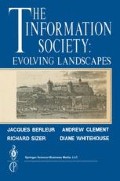Abstract
This paper examines the role of computers in daily human activity from the perspective of the full integration hypothesis. The full integration hypothesis assumes that as information technology evolves it will influence and support virtually every aspect of daily life and work life. The analysis scrutinizes the full integration hypothesis during three eras of information technology: 1) the recent past, 2) the present, and 3) the near future. Empirical research results and present technological capabilities are examined to assess current and future trends and the probable impact on daily activities. In general the analysis indicates that it is only recently, with the advent of the personal computer, that the phrase “computers in daily life” makes sense. Secondly, as computerization becomes more ubiquitous and intensive in daily human activities the nature of the impacts change. Third, the prognosis for the full integration of computers into daily life depends more on social adaptation and acceptance than technological developments. The paper concludes with a set of issues relevant to policy making and future systems design.
Access this chapter
Tax calculation will be finalised at checkout
Purchases are for personal use only
Preview
Unable to display preview. Download preview PDF.
Sources
Ackoff, R. [1967]. “Management Misinformation Systems” Management ScienceDecember, B147—B156.
Bell, Daniel [ 1973 ] The Coming of Post-Industrial Society, New York, Basic Books.
Business Week [1988] The Portable Executive Business WeekOctober 10.
Dickson, Gary W. and Simmons, John K. [ 1970 ]. “The Behavioral Side of MIS”, Business Horizons, Vol. 13, No. 4, pp. 59–71.
Dutton, W., Rogers, E. and Jun, S. [ 1987 ]. “Diffusion and Social Impacts of Personal Computers”, Communications Research, Vol. 14, No. 2, April, 219–250.
Electronic Industries Association [ 1988 ] Estimated Household Penetration by Product, June, Washington, D.C. 20006.
Ellul, Jacques [ 1964 ] The Technological Society, New York, Vintage Books.
Geiss, G. and Viswanathan, N. (Eds.) [ 1986 ]. The Human Edge: Information Technology and Helping People, New York, The Halworth Press, pp. 428.
Ginzberg, Michaël, J. [ 1981 ]. “Early Diagnosis of MIS Implementation Failure”, Management Science, Vol. 27, No. 4, pp. 459–478.
Keen, Peter G.W. [ 1981 ]. “Information Systems and Organizational Change”, Communications of the ACM, Vol. 24, No. 1, pp. 24–33.
Kling, Rob [ 1987 ]. “Desktop Computing in Organizations”, Public Policy Research Organization, University of California, Irvine.
Kraemer, K.L. and King, J.L. [ 1987 ]. “Computers and the Constitution: A Helpful, Harmful, or Harmless Relationship?” Public Administration Review, January/February, 93–105.
Kraemer, K.L., King, J.L., Dunkle, D., Lane, J. and George, J. [ 1986 ]. “The Future of Informations Systems in Local Governments”, Public Policy Research Organization, University of California, Irvine.
Lucas, H.C. Jr. [ 1981 ]. Implementation: The Key to Successful Information Systems, New York, Columbia University Press.
Markus, M.L. [ 1983 ]. “Power, Politics and MIS Implementation”, Communications of the ACM, Vol. 26, No. 6, pp. 430–444
Pettigrew, A.M. [ 1973 ]. The Politics of Organizational Decision Making, London, Tavistock.
Rice, R.E. (Ed.) [ 1984 ]. The New Media, Sage Publications, Beverly Hills, CA.
Rogers, E.M., Daley, H.M. and Wu, T.D. [ 1982 ]. “The Diffusion of Home Computers: An Exploratory Study”, Unpublished Manuscript, Institute for Communications Research, Stanford University.
Toffler, Alvin [ 1970 ] Future Shock, New York, Random House Publishers.
United States Department of Commerce [ 1986 ]. A Competitive Assessment of the United States Microcomputer Industry: Business/Professional Systems, U.S. Government Printing Office, Washington, D.C.
USA Today [ 1985 ]. “Computers: Where They Go”, July 27.
Venkatesh, A. and Vitalari, N.P. [ 1986 ]. “Computer Technology for the Home: Product Strategies for the Next Generation”, Journal of Product Innovation Management, March, 171–183.
Vitalari, N.P., Venkatesh, A. and Gronhaug, K. [ 1985 ]. “Computing in the Home: Shifts in the Time Allocation Patterns of Households”, Communications of the ACM, Vol. 28 No. 5, 512–522.
Vitalari, N.P. and Venkatesh, A. [1987a]. “In-home Computing and Information Services: A Twenty-year Analysis of the Technology and Its Impact”, Telecommunications Policy,Vol. 11, No. 1, March, 65–81.
Vitalari, N.P. and Venkatesh, A. [ 1987b ]. “An Emerging Post-Industrial Work Arrangement: A Theoretical and Empirical Examination of Supplemental Work at Home”, Working Paper, Public Policy Research Organization, University of California, Irvine.
Vitalari, N.P. and Venkatesh, A. [ 1988 ]. “Project NOAH: A Longitudinal Investigation of the Social Impacts of Computing in the Home”, Unpublished Manuscript, Public Policy Research Organization, University of California, Irvine.
Editor information
Editors and Affiliations
Rights and permissions
Copyright information
© 1990 Springer Science+Business Media New York
About this chapter
Cite this chapter
Vitalari, N.P. (1990). Information Technology in Daily Life. In: Berleur, J., Clement, A., Sizer, R., Whitehouse, D. (eds) The Information Society: Evolving Landscapes. Springer, New York, NY. https://doi.org/10.1007/978-1-4757-4328-9_6
Download citation
DOI: https://doi.org/10.1007/978-1-4757-4328-9_6
Publisher Name: Springer, New York, NY
Print ISBN: 978-0-387-97453-8
Online ISBN: 978-1-4757-4328-9
eBook Packages: Springer Book Archive

